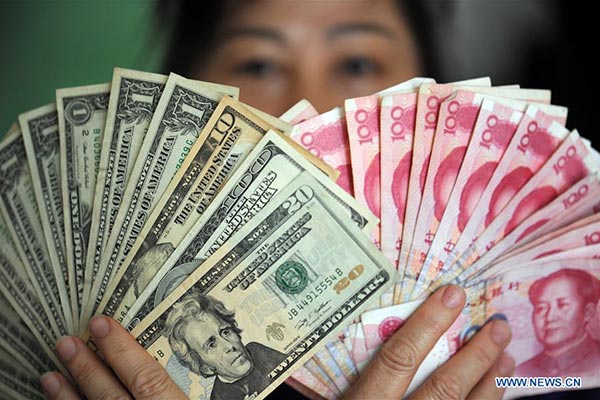US yuan trading, clearing advocates make rallying call
Updated: 2016-04-25 15:35
(Xinhua)
|
|||||||||
 |
|
A residents shows China's yuan and US dollar banknotes in Qionghai, South China's Hainan province, Jan 7, 2016. [Photo/Xinhua] |
Mary Schapiro, vice chair of the Working Group on US yuan Trading and Clearing, said in an interview with Xinhua that demand for yuan in the United States is on the rise.
Chinese and US leaders agreed in Washington in September that the two countries should strengthen financial cooperation and facilitate yuan trading and clearing in the United States.
Shortly afterward, former New York mayor and business tycoon Michael Bloomberg led the formation of the working group from senior members of the private sector.
Co-chaired by former US Treasury Secretary Timothy Geithner, former Secretary of the Treasury Henry Paulson, as well as President and CEO of the US Chamber of Commerce Thomas Donohue, the group has 22 members including leading international financial institutions, five Chinese banks and the US Chamber of Commerce.
"Having trading and clearing of the yuan in the United States will enhance the competitiveness of US companies, lower transaction costs and increase efficiency," Schapiro told Xinhua.
"It can help them build stronger trading relationships and business partnerships with China and should encourage more bilateral trade and investment."
The working group has surveyed US companies and traders on current and potential yuan demand and released initial observations in early April.
"Right now, the demand for yuan in the United States is not as high as we expected, but we think there is tremendous potential for demand to increase," Schapiro said.
In January, the yuan remained the fifth most active currency for global payments by value and accounted for 2.45 percent of global payments, a slight increase from 2.31 percent in December 2015, according to data from the Society for Worldwide Interbank Financial Telecommunication, a global financial data provider.
Kevin Sheekey, chairman of external relations for Bloomberg L.P., told Xinhua that the US market's dollar-centric approach is changing with the yuan becoming more internationalized.
He said the working group is preparing for a multi-currency world which would include the yuan.
"Everyone agrees that the future importance of the yuan is going forward, and thus needs to provide trading centers to convert that," he said.
China has set up offshore yuan trading hubs in Hong Kong, London and Toronto. The US market remains untapped.
"We keep talking about hubs and spokes and wheels, but we are not reinventing the wheel entirely in the United States," Schapiro said. "We hope the experience that China had with different hubs allows us to move more quickly."
She characterized financial institutions in the United States as more diversified than in other locations. That adds complexity to the mechanism.
The working group is aiming to produce a final report to regulators in June that would lay out a road-map for how to strengthen access to yuan in the United States.
China has been aggressively pushing for the yuan's global use, as the Chinese economy is becoming increasingly intertwined with the rest of the world.
In November, the International Monetary Fund approved the inclusion of yuan into the Special Drawing Rights basket, recognizing the yuan's position as an international reserve currency.
Although the yuan has gained more popularity, its activity share remains small compared with the US dollar, the Euro, the British Pound and the Japanese Yen.
Related Stories
China's forex market turnover hits 10.7t yuan in March 2016-04-23 10:07
Falls in yuan seen as 'stable' by forex watchdog 2016-04-22 07:32
Flight of capital eases; currency exchange stable 2016-03-23 09:21
Stable yuan lifts China's foreign currency reserves 2016-04-08 11:00
PBOC rules out currency devaluation as means to boost economy 2016-03-12 11:40
Today's Top News
Banks offer passport to integration
Obama casts doubt on post-EU deal
Chinese runners flood London for marathon
Chinese philanthropists explore British way of 'giving'
Back on the up
China leads way on US adoptions
Ericsson reshapes and sees Q1 profit rising
Snowden sues Norway to seek safe travel to get prize
Hot Topics
Lunar probe , China growth forecasts, Emission rules get tougher, China seen through 'colored lens', International board,
Editor's Picks

|

|

|

|

|

|







